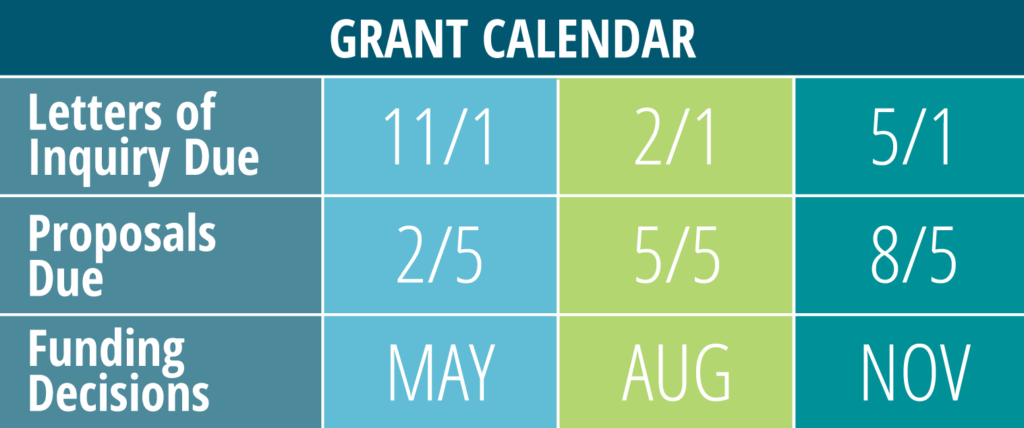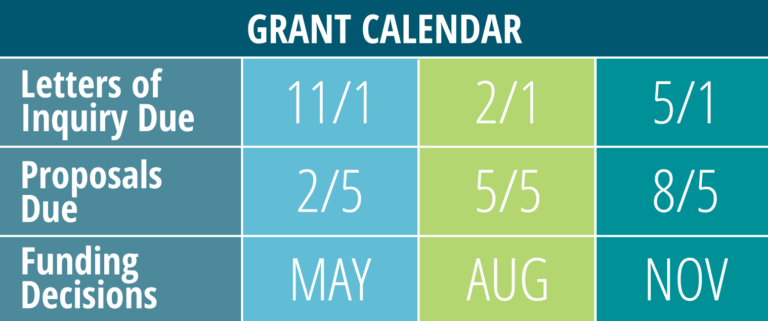
Research Grants
RRF funds research that seeks to identify interventions, policies and practices to improve the well-being of older adults and/or their caregivers. Preference is given to projects aimed at generating practical knowledge and guidance that can be used by advocates, policy-makers, providers, and the aging network. Of particular interest are:
Interventional trials; translational studies; and health services and policy research
Projects that build on the investigator’s past studies
Proposals that include robust dissemination plans, if appropriate, to assure that findings reach audiences positioned to act on them
Research Grants are provided to nonprofit organizations that are:
- Proposing applied research projects that have immediate and direct implications on the adult population, age 60 and older
- Proposing a project that will have national relevance across the U.S. or regional relevance within the state of Illinois
General Grant Exclusions
RRF generally does not fund:
- Projects that are not intentionally focused on older people, age 60 and above
- Projects outside of the United States
- Grants to individuals
- Lobbying
- General operating expenses or support for ongoing programs without significant changes in strategy or focus
- Biomedical research, basic theory development for social science research, or research and development for new technology
- Construction of facilities, capital improvements, or computer equipment
- Conferences, publications, or production of films and videos unless they are integral components of a larger project
- Dissertation research, tuition expenses, or education programs for undergraduate or graduate students
- Endowments, capital campaigns, or fundraising events
- Private foundations
- Financial deficits
All applicants are required to submit a Letter of Inquiry (LOI) before being invited to submit a full grant proposal. Please reference the Grant Calendar below to determine the next deadline.
While RRF’s previous LOI process involved submitting Word or PDF documents, the new process will consist of completing an online form, including a series of written prompts. You can watch an instructional video walkthrough of our application process here.
Organizations may submit only one Letter of Inquiry per deadline. Common exceptions include LOIs submitted by separate departments of large universities. It is recommended that you check with your colleagues and/or development staff prior to submission to ensure only one proposal is submitted.
LOIs will be accepted no later than 11:59 PM (CT) of the deadline day. If the deadline falls on a weekend or holiday, LOIs will be accepted as late as 5:00 PM (CT) the following workday.
RRF will review LOIs and respond to applicants approximately six weeks after the LOI submission deadline. Applicants invited to submit a full proposal have one year after the LOI deadline to submit.

RRF requires interested applicants to submit a brief Letter of Inquiry (LOI) prior to submitting a full proposal. RRF will then invite applicants whose work appropriately aligns with RRF’s priorities and other funding considerations to submit a full proposal. Those that are not invited need to wait a year before submitting another LOI for the same project.
The LOI must be submitted online.
If you have already submitted an LOI in the past year, please contact us for further instructions.
We highly recommend you prepare your responses offline before moving to the online submission portal and copy/paste your responses in the appropriate fields.
The following information will be requested in the LOI submission process:
- Organizational Information
- Legal Name, Employer ID Number (EIN)
- Address, Phone Number
- Current Fiscal Year Budget
- Contact Information
- Name, Office Address, Email, and Office Phone Number for the project’s Primary Contact, and the organization’s Primary Contact.
- Project Information
- Project Title
- Brief Project Description (1-2 sentences)
- Estimated Length of Project, Project Start and End Dates
- Estimated Total Project Cost, Amount of Funding already Secured (if applicable)
- Amount Requested of RRF
- RRF grant pathway (Advocacy, Direct Service, Professional Education & Training, Research, or Organizational Capacity Building) that best describes your proposed project.
- RRF priority area (Caregiving, Housing, Economic Security in Later Life, or Social and Intergenerational Connectedness) your project addresses. Select only the primary area. If your project does not directly align with a Priority Area, you are welcome to submit an idea for consideration as an “Other Promising Project.”
LOI Written Prompts
Statement of Need and Proposed Solution
- Provide a brief (no more than 2 paragraphs – approximately 350 words) statement about the primary issue the project will address, how you intend to address it, and why this project is needed at this time. If you indicated that your project falls into the category of “Other Promising Projects,” use this space to discuss how your project: presents a promising opportunity to advance the field of aging; addresses a time-sensitive and urgent issue; promotes a new opportunity for collaboration; or promotes positive perceptions of aging.
Goals and Objectives
- Tell us the overarching Goals and SMART(IE) Objectives of your project. You should have no more than 1-2 goals, and each goal should have no more than 3-4 objectives. You may use bullet points in this section.
Target Population
- Provide a description of the target population, including number of people your project will reach/effect (sample size for research proposals), how you will reach the population (recruitment), and demographic information or geographic location where relevant. This description should be no more than 1 paragraph – approximately 150 words.
Diversity, Equity, Inclusion (DEI) Lens
- In two to three sentences, please describe how your organization will bring a DEI lens to the proposed project. If your project does not have a DEI focus, write “N/A.”
- RRF’s definition of Diversity, Equity, and Inclusion can be found on RRF’s Frequently Asked Questions webpage.
Methods
- Please describe the specific methods you will use to accomplish your goals and objectives. No more than 2 paragraphs – approximately 350 words.
- For a research project, include the study design and information on the intervention where relevant.
Evaluation and Impact
- Discuss your evaluation criteria and methods, this section should include expected outcomes and a brief statement on dissemination where applicable. This section should be no more than 1-2 paragraphs – approximately 200 words.
- For research projects, include information on measurement strategies, data collection, and planned analyses.
- To learn more about the important components of evaluation plans, we highly recommend reading “How Do Foundations and Funders Approach Evaluation and Impact?” from the Summer 2024 edition of the American Society on Aging’s Generations
Organizational Qualifications/Partners/Stakeholders
- Include information on who is leading the project, their qualifications, and partner organizations/stakeholders that will be involved. No more than 2 paragraphs – approximately 350 words.
Prospective Project Budget
- In a few sentences, describe how you generally anticipate RRF funds being used to support your proposed project (i.e., supporting costs for personnel, consultants, program materials, technology, dissemination activities).
Once these materials are prepared, you may move on to the next step of completing your LOI application online.
Once you have prepared the materials referenced in Step 3, you may submit your Letter of Inquiry using RRF’s online grant portal.
Before you Start a New LOI:
Please read the following instructions carefully before accessing RRF’s online portal. RRF recommends printing or saving these instructions for reference when continuing work on our online LOI form.
Google Chrome will not function properly with RRF’s grant portal. You must use another Internet Browser to prevent compatibility issues while applying, such as Firefox, Safari, or Microsoft Edge.
To begin a new LOI, click the button below. Be sure to click on this button only ONCE, as clicking more than once will result in multiple blank application forms.
If this is the first time you are using RRF’s online portal, you will need to click on the New Applicant? Button located below the E-mail field to create a new account.

Once you sign in or create an account, a new LOI form will be created. When you finish a section of the form, click on the “Next” button displayed at the bottom of the screen to continue to the next section. If you need to stop working on the form before it is complete, click on the “Save & Finish Later” button, so that you can return to the application at a later date. We highly recommend saving your application regularly (every thirty minutes) to avoid timeout errors.
![]()
If Continuing an LOI:
To continue working on an RRF LOI, click on the button below.
Please note, inactive applications will be purged from our system following 120 days of inactivity.
If you have multiple application forms listed, please delete each blank, unneeded form by clicking on the trash can icon displayed to the right of the application form’s listing in your online account.
If you encounter issues or have any unanswered questions, please contact RRF Foundation for Aging at 773-714-8080 or via email.
If you are invited to submit a full proposal, you will be sent an email with detailed instructions on the application process.
Applicants invited to submit a full proposal have one year after the LOI deadline to submit. Example – For a LOI submitted on the November 1st deadline, an invited applicant has three deadlines to submit a full proposal:
- February 5th
- May 5th
- August 5th
Proposals will be accepted no later than 11:59 PM (CT) of the deadline day. If the deadline falls on a weekend or holiday, proposals will be accepted as late as 5:00 PM (CT) the following workday.
In addition to reviewing and updating any project details outlined in your Letter of Inquiry, the online application will include a field to provide a description of your project’s Diversity, Equity, and Inclusion (DEI) Lens – if applicable.
- In two to three sentences, please describe how your organization will bring a DEI lens to the proposed project. If your project does not have a DEI focus, write “N/A.” Additional information can be provided in the Project Narrative attachment.
- RRF’s definition of Diversity, Equity, and Inclusion can be found on RRF’s Frequently Asked Questions webpage.
All other proposal materials outlined below will be attached to the application as separate documents.
Formatting Guidelines:
- Kindly use a 12-point Arial font
- Word documents should be single-spaced with 1” margins
- References are to be cited in APA format
- The Executive Summary, Proposal Narrative, Budget Narrative, and Timeline are to be uploaded as Microsoft Office documents (.doc/.docx or .xls files)
- The Budget should be uploaded as a Microsoft Excel file
- Please note that, except for the Executive Summary and Bios/Resumes, there is no page or length restriction
- The Executive Summary is a separate two- to three-page summary that concisely describes the project. The Executive Summary offers a succinct overview of your project and allows RRF to better understand what you are trying to accomplish. Include brief information about the project’s need, objectives, methods, time frame, total cost, and the amount requested from RRF. If the proposed study is technical in nature, please use lay terminology in the Executive Summary.
- The Proposal Narrative provides an opportunity for you to describe your project thoroughly to RRF by addressing the following:
- Applicant Organization
- Include a brief history of your organization, recent accomplishments, and the organization’s qualifications to lead this project
- Project Significance
- Importance and relevance of the proposed project
- Literature review, describing existing knowledge related to the study’s aims and methods
- How the project complements or extends existing knowledge in the field
- Anticipated contribution to the field
- Preliminary Studies
- Describe work you or your team has completed to date and how what is proposed builds on it; if none, state this
- Project Goals and Objectives
- Provide clear, concise, and complete goals and objectives
- State the study’s hypotheses or specific research questions
- Proposed Methods
- Research design
- Discuss the type of research design, rationale for choosing that design, and information on control groups, if applicable
- Sequence of the investigation
- Sampling Plan
- Discuss how samples will be identified and/or recruited, inclusion/exclusion criteria, sample sizes and, if possible, provide a statistical power calculation
- Measurement
- Discuss measurement, including operational definitions for all dependent, antecedent, and intervening variables
- If existing scales are to be used, cite the references for each
- If new measures are to be used, describe the process by which they are/will be developed and tested
- Data collection plan
- Explain who will collect each set of data, how they will do so, and when the data will be collected
- Address how you will handle problems such as missing data or non-response to surveys
- Data analysis plan
- Discuss the stages you will use to analyze your data and what statistics you will run
- Discuss different potential findings that might emerge, what conclusions you would draw from each, and what additional data analyses you would run as a result
- Please name any statistical consultants you will rely on and include their resumes with your proposal
- Ethical issues (if applicable)
- Discuss how you will address issues of confidentiality, informed consent, and other human subject concerns
- Research design
- Dissemination
- Share products, tools, reports, briefs, policy research papers, professional journals, etc., that will be developed (include samples, if applicable)
- Describe target audiences that findings will be disseminated to, including groups, meetings, symposiums, etc., where the outcomes will be discussed, if appropriate
- Plans for Continued Support
- Clarify what you hope to know and will not be able to ascertain with the proposed research and future steps you would take as a function of different patterns of outcomes from your work
- Describe plans to fund any next phases of the research
- Personnel
- Provide information about project director or principal investigator, co-investigators, and other key personnel and their qualifications to lead this project.
- Include job descriptions for any staff to be hired (as a separate attachment)
- Applicant Organization
- The Budget, Budget Narrative, and Timeline will be uploaded as three individual Microsoft Office documents. While RRF does not require a standard form for these documents, samples are provided for illustrative purposes. You may use more than one page for each document.
- The Line Item Budget includes all expenses and income, including grant funds requested from RRF and funds received and/or requested from other sources for this project, if any. Please include the percentage of time allocated for project staff. Up to 10% of the funds requested from RRF may be allocated for indirect project costs. See RRF’s Budget Sample.
- The Budget Narrative describes how the budget relates to the proposed project activities. Budget narratives generally contain a description for each line item identified in the budget, explaining how the request amount was computed. See RRF’s Budget Narrative Sample.
- The Timeline corresponds directly to the activities that are described in the proposal. See RRF’s Timeline Sample.
- In addition to the documents listed above, you will also be asked to upload:
- IRS 501(c)(3) designation letter or other evidence of federal nonprofit status
- Most recent audited financial report (preferred) or IRS 990
- If applicable: Signed letters of support/commitment. Upload in one file
- Submit signed letters of support, letters of commitment, and/or memoranda of understanding from relevant stakeholders, collaborators, and/or consultants. Be sure all letters are personalized and express a clear understanding of the project, of roles collaborators will play, and any financial agreements.
- Optional: Resumes of no more than 2-3 pages for the Project Director and other key project staff. Include job descriptions for positions to be filled. Upload in one file
- Optional: Most recent annual report
Once your application materials are completed, you can access our online grantee portal via our “Continue an Application” button.
If you encounter issues or have any unanswered questions, please contact RRF Foundation for Aging at 773-714-8080 or via email.
The due dates for all grant reports are listed on page four of the RRF Grant Award Letters sent to applicants who are awarded grants.
The need for both interim reports and a final report is at the discretion of the RRF Program Officer assigned to a grant. Therefore, interim reports may be required for some grants, but not for others.
Grantees will submit their reports electronically via the applicable report form(s) uploaded into the grantees’ RRF Online Applications and Requirements accounts. Approximately one month before a report due date ,grantees will receive an email notifying them when the applicable report form(s) have been uploaded into their account. In addition, they will receive instructions about how to access the forms via an RRF Online Applications and Requirements Account.
Documents describing the information to be included in the grant report(s) may be accessed via the links below:
Things to Know

Learn about general grant exclusions, search our FAQs, watch an instructional video on our application process, read evaluation guidelines and learn how to develop SMART objectives.





